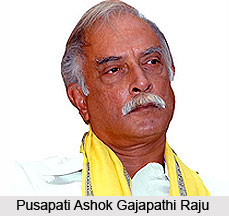 Pusapati Ashok Gajapathi Raju is an Indian politician who has been designated as the Union Minister of Civil Aviation in the Cabinet of Narendra Modi`s Government in 16th Lok Sabha. He is also known to be the titular Raja of Vizianagaram estate in Andhra Pradesh. He has been a seven time-MLA, elected from the Vizianagaram constituency of Andhra Pradesh. He is also the founder of Maharajah Alak Narayan Society of Arts and Science (MANSAS) which has been established with a vision of confounding socio-academic inequalities.
Pusapati Ashok Gajapathi Raju is an Indian politician who has been designated as the Union Minister of Civil Aviation in the Cabinet of Narendra Modi`s Government in 16th Lok Sabha. He is also known to be the titular Raja of Vizianagaram estate in Andhra Pradesh. He has been a seven time-MLA, elected from the Vizianagaram constituency of Andhra Pradesh. He is also the founder of Maharajah Alak Narayan Society of Arts and Science (MANSAS) which has been established with a vision of confounding socio-academic inequalities.
Early Life of Pusapati Ashok Gajapathi Raju
Pusapati Ashok Gajapathi Raju was born in the year 1951 to the Pusapati royal family of Vizianagaram in Andhra Pradesh. He completed his schooling from Gwalior Scindia School and Hyderabad Public School. For higher education he attended V.S. Krishna College in Visakhapatnam. His family is recognized as the chief patron of Simhachalam temple since ages. His father Pusapati Vijaya Rama Gajapati Raju (born 1 May 1924 - died 14 November 1995) also served the Indian politics as an Indian parliamentarian and was also a philanthropist. Family of Pusapati Ashok Gajapathi Raju is known to be associated with philanthropic activities in north coastal Andhra Pradesh and have donated lands in Vizianagaram, Srikakulam and Visakhapatnam for educational institutions.
Political Career of Pusapati Ashok Gajapathi Raju
Pusapati Ashok Gajapathi Raju is a well read and widely travelled man, recognized for his clean image in the Indian politics. He has been elected as MLA from the Vizianagaram Assembly Constituency of Andhra Pradesh for seven terms. He won for the first time as Janata Party candidate in the year 1978. However in the remaining elections in 1983, 1985, 1989, 1994, 1999 and 2009, he was elected as a candidate of Telugu Desam Party (TDP). He has been the member of TDP since its formation in the year 1982 under the leadership of late Chief Minister N. T. Rama Rao. He took charge of various offices including Excise Ministry and Commercial Taxes Ministry in the Cabinet of N. T. Rama Rao and Finance and Legislative Affairs Ministry and Revenue Ministry in the Cabinet of Chandrababu Naidu. He is also the Politburo member in Telugu Desam Party. In the 2014 Lok Sabha election he won the Vizianagaram parliamentary seat. Currently serving as the Minister of Civil Aviation, he is the sole representative of the TDP in the Cabinet, which is a major ally of the NDA from the South.






